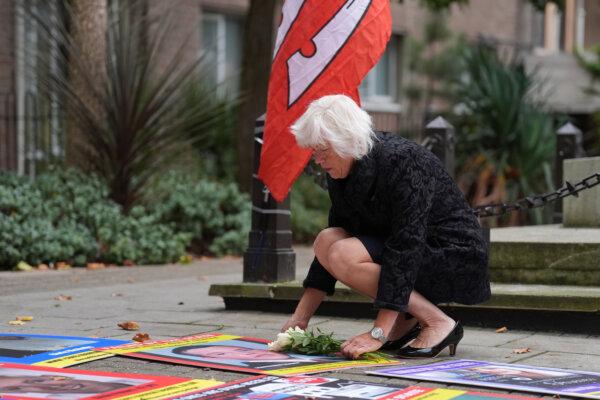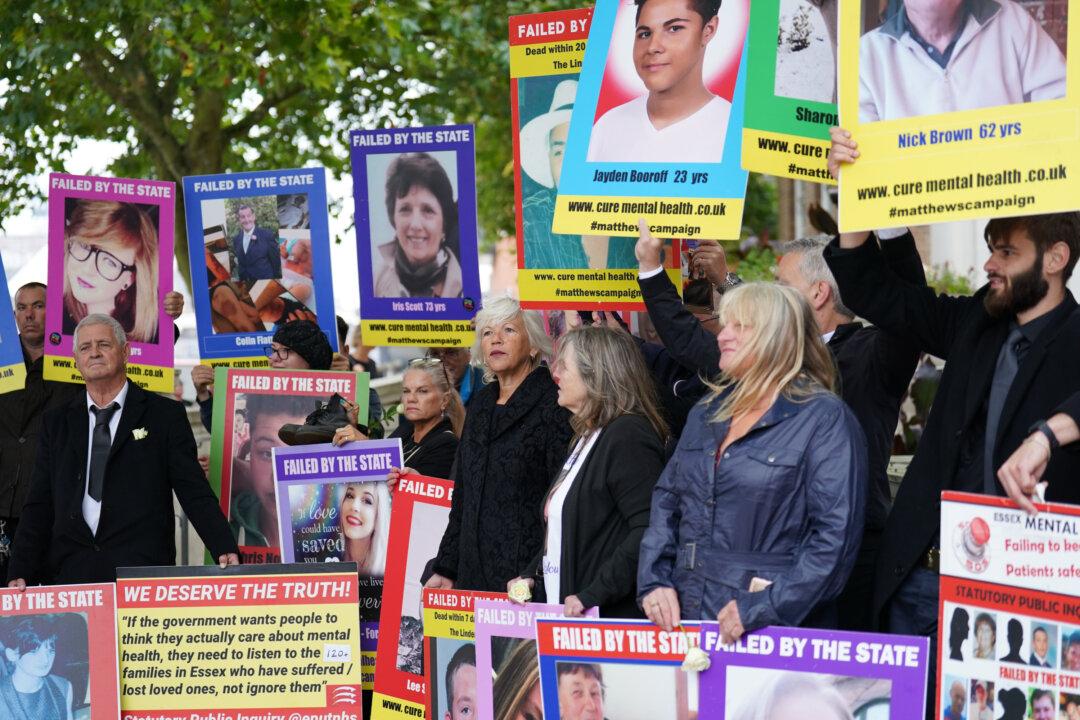An inquiry examining the deaths of more than 2,000 mental health patients under the care of the NHS in Essex will investigate alleged failings on a “scale that’s deeply shocking,” according to its chairwoman.
Baroness Kate Lampard said as she opened the statutory inquiry on Monday that the exact number of people who died because of the alleged failings in their care may never be known, but is likely to be “significantly in excess” of 2,000.
She said she is “committed” to publish a figure but, “this number is only ever likely to be approximate and I find it shocking we may never be able to say for sure how many people died in the remit of this inquiry.”
The parents and families of some of those who died gathered outside the inquiry venue in Chelmsford, laying placards on the pavement with photos of their loved ones.
Families Demanding ‘Truth, Justice and Accountability’
Among the banners on display was one saying “We will not be silenced”, while another read “We demand truth justice accountability change” and a third stated, “Failed by Essex mental health services.”The Lampard Inquiry will investigate the deaths of people who were receiving mental health inpatient care in Essex between 2000 and 2023, including those who died within three months of discharge and those who died as inpatients receiving NHS-funded care in the independent sector.
The Essex Mental Health Independent Inquiry was established in 2021, initially without statutory status, but was upgraded to a statutory footing last year, granting it legal powers to compel witnesses to give evidence.
Opening the inquiry, Lampard said hearings will be “investigating matters of the gravest concern and significance.”
She extended her “deepest sympathy” to the loved ones of those who have died, and held a minute’s silence as a mark of respect.
Melanie Leahy led the campaign for an inquiry following the suicide of her 20-year-old son, Matthew, while he was detained at the Linden Centre in Chelmsford, run by the North Essex Partnership University NHS Foundation Trust.
She wrote: “Matthew was taken to, ‘a place of safety’, and died 7 days later. 24 others died by the same means, dating back to the year 2000. An indicator that little was done to address the growing problems. Something went terribly wrong with the NHS Mental Health Services provided to my son.”
‘Significant Failings’
The report states that: “We found a series of significant failings in both cases. In Matthew’s, these were compounded by an insufficient Serious Incident Investigation,” adding that there was a lack of accountability for mistakes at the top level in the trust, and that there appeared to be “a systemic failure to tackle repeated and critical failings over an unacceptable period of time.”Mr. R died, also aged 20, in December 2008 and Matthew Leahy in November 2012, with the Ombudsman expressing concern that lessons from the former’s death which might have prevented further suicides did not appear to have been learnt.
An inquest into the death of Mr. R ruled that he had taken his own life, “while the balance of his mind was disturbed, before his illness was fully diagnosed to ensure a suitable care programme to be implemented to manage his condition. These factors more than minimally contributed to [his] death.”
Despite the trust’s internal investigation finding that Matthew Leahy’s care had been “good,” the inquest into his death found that he “was subject to a series of multiple failings and missed opportunities over a prolonged period of time by those entrusted with his care.”

‘High-Risk Ligature Points’
The report highlighted that in 2015, a Care Quality Commission (CQC) inspection identified a number “of high-risk ligature points” around the mental health wards at the Linden Centre, which had not been identified by the trust’s internal safety audits. Both Mr. R and Matthew Leahy were found hanging.Following a parliamentary debate in November 2020, the Lampard probe was established and will be the first ever public inquiry into mental health services to be held in England.
Deborah Coles from the charity INQUEST, which is a core participant in the inquiry because of its expertise around mental health-related deaths, said in a statement: “We can all agree that when people die in the care of mental health services, their deaths must be investigated, and action must be taken to prevent further deaths.
“Instead, families bereaved by deaths in Essex mental health services have been denied the truth, kept in the dark and their calls for change left unanswered.
“Too often NHS Trusts and other providers respond to deaths with defensiveness and denial rather than candour, transparency and a genuine commitment to improving policy and practice.”
She paid tribute to “the courage, persistence and determination of bereaved families and survivors campaigning for the truth for so many years,” and called on the inquiry to “now finally shine a spotlight behind the closed doors of Essex mental health services and tackle the unacceptable death toll of people under their care. ”
Following a pledge in the Labour manifesto, the government introduced legislation in the King’s Speech to reform the Mental Health Act of 1983. This had been promised by the Conservatives in their 2019 election manifesto, but was not delivered during the last parliament,
The government said its planned bill would ensure “patients have greater choice, autonomy, rights and support, and make sure all patients are treated with dignity and respect throughout their treatment,” and will narrow the criteria under which people can be detained under the Mental Health Act.
The inquiry is holding public hearings until Sept. 25, with further remote hearings due to take place in November.







